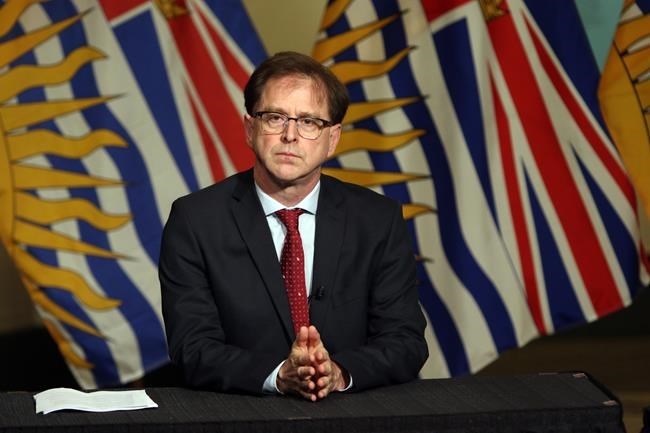
Health Minister Adrian Dix looks during a press conference in the rotunda at Legislature in Victoria, B.C., on Wednesday May 6, 2020. British Columbia's health minister says the province has hired more staff and increased operating-room hours to catch up on cancelled surgeries but a significant surge in COVID-19 cases could impact recovery. THE CANADIAN PRESS/Chad Hipolito
Republished July 21, 2020 - 4:26 PM
Original Publication Date July 21, 2020 - 1:56 PM
VICTORIA - British Columbia's health minister says the province has hired more staff and increased operating-room hours to catch up on cancelled surgeries but a significant surge in COVID-19 cases could impact recovery.
Adrian Dix said Tuesday that 32,400 procedures were postponed or not scheduled as of mid-March to retain beds that may have been needed for COVID-19 patients.
Combined with patients already on wait lists, the number of people waiting for procedures ballooned to over 95,000.
Dix said 62,744 patients whose surgeries were cancelled have been contacted and most have said they're ready to go ahead with their procedure.
About half the patients whose surgeries were postponed in the spring had them between May 18 and June 25, he said.
"In an undertaking of this size and with a resurgence or a potential second wave being a legitimate concern, setting target timelines and achieving them is essential," Dix said in his first progress report on the province's plan to clear the backlog.
"On June 25 we achieved 97 per cent of operating hours for the same period in 2019. Given where we were starting from, an extraordinary achievement."
Dix said it's up to residents to continue taking measures to slow down the rate of COVID-19 after 132 cases have been reported over four days, reversing a downward trend.
"We have to know that if we continue to do the things that we're supposed to do we can have surgery, we can have visits, we can get out into the community and we can enjoy our summer."
Michael Marchbank, former CEO of Fraser Health and consultant to the Health Ministry, said the backlog could be cleared in 15 months, down from a forecast of two years made in May.
Marchbank said the plan that involved recruiting operating-room nurses and 29 anesthesiologists since April has meant the usual summer slowdown in procedures will be reduced by 52 per cent this year compared with 2019.
Cancer, cardiac and neurosurgery patients will be prioritized, he said.
Marchbank said the time it's taking to do surgeries has increased by an estimated 26 per cent due to the additional infection prevention control protocols put into place due to COVID-19.
He said that while wait lists increased by 7,900 cases from mid-March to mid-May, a further 24,400 patients that would have been placed on lists did not materialize. That's possibly due to physicians' offices being closed.
"I think it's fair to say that our initial progress is encouraging, and I think it has been quite significant. However, I don't want to say that everything is going to be perfect because I don't think it is," he said, adding progress will involve "a lot of hard work."
"We have to make sure there are sufficient staff. We have to make sure there are efficiencies in the system and how we manage patients on wait lists. We have to implement new schedules and support extended days and weekends, which is new for the system."
Jason Sutherland, a professor at the University of British Columbia’s Centre for Health Services and Policy Research, said staffing will be a key issue in meeting the goals.
"I think they have a health human resource problem, just because they run it so thin already. There's not a huge oversupply of nurses just waiting to work in an OR," he said.
"If they have to go to contract firms to get more nurses it's going to cost three times as much. Maybe they can do it but not at a price anyone wants to know."
The needs of patients who are still waiting months for non-urgent surgeries should be tracked and met, including counselling for those who often suffer from depression, Sutherland said.
"They have no idea who's out of work, they have no idea who's in pain, they have no idea who can't care for their kids. They don't collect that part of the information that we would think would be valuable."
This report by The Canadian Press was first published July 21, 2020.
News from © The Canadian Press, 2020